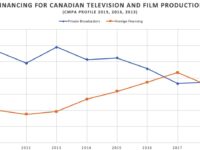In recent months, Canadian Heritage Minister Steven Guilbeault has emerged as the de facto digital policy lead minister in Canada with Navdeep Bains largely silent on the race to regulate everything from online linking to how Canadian content is promoted on digital streaming services. New legislation is still forthcoming, but recent comments to industry town halls and press reports provide a good sense of what Guilbeault has in mind. In short, it appears the government will establish an extensive regulatory structure for digital services with registration or licensing requirements and mandated payments for a host of online activities. The amounts payable will be established through hearings at the CRTC and the Copyright Board of Canada. The government would retain the power to fine companies that fail to comply with the payment requirements and use a policy direction to the CRTC to make its policy intentions clear.
Blog
Four Million Downloads and Counting: Everyone Should Install the COVID Alert App
Earlier this summer, I posted on why I installed the COVID Alert App, the national exposure notification app designed to provide Canadians with an alert if they may have been exposed to COVID-19. The post discusses the privacy safeguards that have been built into the app, the reviews from both the federal and Ontario provincial privacy commissioners, and points to previous Lawbytes podcasts (Edwards, Clayton, Kosseim) that discuss the use of technology to help counter the spread of the virus. While there were some concerns (notably the ongoing concerns with social inequities), I concluded that the safeguards combined with the public health benefits were enough to justify installation (Apple, Android).
What Happened to Canada’s Innovation Agenda?: How Innovation Policy Has Been Sidelined By Cultural Policies and Misplaced Provincial Prioritization of Patents
It was just five years ago that the Liberal party, then mired in third place nationally, made innovation a centerpiece of its electoral strategy. The 2015 Liberal platform referenced “innovation” 10 times with promises to establish a national innovation agenda that would touch on everything from agriculture to the everyday work of government. Within weeks of the election, the role of industry minister was recast as the innovation, science and economic development minister, armed with a mandate letter peppered with instructions to pursue an innovation agenda.
Fast forward to 2020 and innovation has largely disappeared from the government’s radar screen with the word banished from the 2019 election platform. My Globe and Mail op-ed notes that the response to COVID-19 has understandably emerged as job one, but the disappearance of innovation as a government policy priority raises serious concerns about how Canada will foster the economic growth needed to help recover from the devastating effects of the global pandemic.
Guilbeault’s Bogus Billion Dollar Claim: What the Data Actually Says About Canadian Film and TV Production
Canadian Heritage Minister Steven Guilbeault has said that his top legislative priority is to “get money from web giants.” While much of the attention has focused on his ill-advised plan to require Facebook to obtain licences for linking to news articles, his first legislative step is likely to target Internet streamers such as Netflix, Amazon and Disney with new requirements to fund Canadian content and to increase its “discoverability” by making it more prominent for subscribers. Based on his comments at several town halls, Guilbeault is likely to also create new incentives for supporting indigenous and persons of colour in the sector with a bonus for those investments (potentially treating $1 of investment as $1.50 for the purposes of meeting Cancon spending requirements). Much of the actual implementation will fall to the CRTC, which will be granted significant new regulatory powers and targeted with a policy direction.
“Get Money from Web Giants” Grows: Canadian Heritage Minister Guilbeault Says Government Working on a New Data Tax
Canadian Heritage Minister Steven Guilbeault has said that his top legislative priority is to “get money from web giants.” That approach has typically been taken to mean the introduction of digital sales taxes and mandated Cancon payments from Internet streaming services such as Netflix. More recently, Guilbeault has raised the possibility of a link tax or licence, which would be paid by companies such as Facebook or Google merely for linking to news articles. If that wasn’t a sufficiently large digital tax agenda, Guilbeault now says the government is also planning new taxes on data and online advertising. Guilbeault told Evan Solomon:











